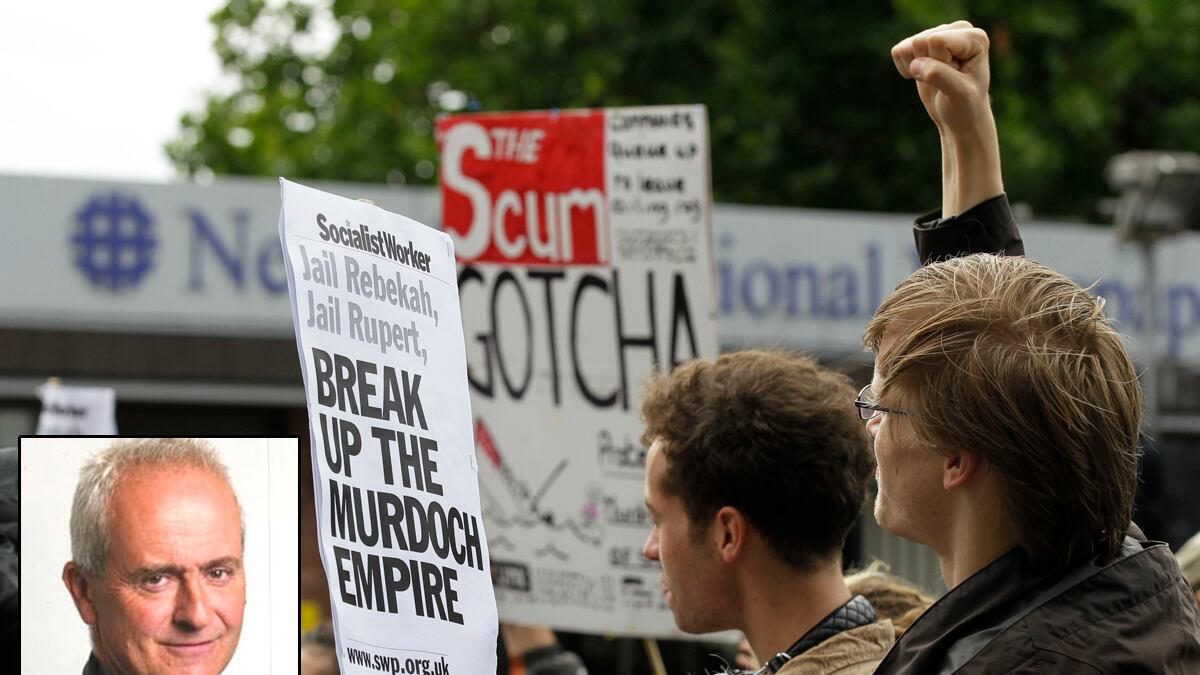When Nick Davies, investigative reporter for The Guardian newspaper in London, filed a story two weeks ago revealing how The News of the World had tapped into the voicemail of a murdered schoolgirl, he appended a message for his editor: This was, in his view, the “most powerful” piece so far on the phone hacking scandal that has rocked Rupert Murdoch’s media group.
In retrospect, his assessment seems modest. The story’s impact has surprised even Davies: “I wouldn’t have believed you if you had told me then that within four days they’d be announcing the closing of The News of the World, and the following week we would see the resignation of Rebekah Brooks and Les Hinton,” two of Murdoch’s most senior lieutenants.
More is sure to follow. Over the weekend, British newspapers carried full-page apologies from Murdoch himself over the activities of The News of the World. This week will see Murdoch, his son James, and Brooks—arrested today over allegations of hacking and bribery—appear before a parliamentary committee. In Davies’ words, there is a “firestorm burning through the Murdoch empire.”
And it’s Davies who’s largely responsible for igniting the blaze. His work for The Guardian has uncovered not just the massive extent of the hacking at The News of the World, but also the scary level of collusion between a manipulative Murdoch press, the police, and politicians.

Davies’ own interest dates back to 2007 when former News of the World royal editor Clive Goodman and private investigator Glenn Mulcaire were jailed for accessing royal phone messages. Flaws in the official version from Murdoch’s News International—wrongdoing limited to a few names and a rogue reporter—were “screamingly obvious,” he says.
A breakthrough came the following year when Davies was contacted by a “good and well-informed person.” Outraged by the News of the World’s denials of wrongdoing, the source—who must remain “forever anonymous”—offered his services in uncovering the facts.
By 2009, Davies was ready to publish a breakthrough piece telling how the paper had effectively bought the silence of a leading hacking victim, Gordon Taylor, boss of the Professional Footballers Association. Soon afterward, the paper disclosed that the full list of victims ran to the thousands.
Success has taken a persistence that was apparent early in Davies’ career. After graduating from Oxford in 1974, he worked as a stable lad, a builder, and a railway guard before Woodward and Bernstein’s efforts to expose the Watergate scandal, leading to President Nixon’s resignation, inspired him to try journalism. Taking a job as a messenger at The Guardian, he applied for “about 100 jobs” before finding a post as trainee on a local newspaper.
Since then he has picked up a clutch of awards for his work. Now 58, he works freelance for The Guardian. His books include Flat Earth News, an expose on the falsehood and distortion in the world media, published in 2008, and White Lies, an account of a racially driven miscarriage of justice in Texas, written during a freelance stint in America.
In the hacking affair, the problem lay more with nailing down lawyer-proof evidence than establishing the truth. “All the way through I knew what the truth was because I really had a lot of people in the background helping me. For example, more than a dozen former News of the World journalists have been involved in pushing this story from behind the scenes. If you have a dozen different people, and each of them independently tells you essentially the same story, you are entitled to say you know what the truth is.”
If the power of News International over the British establishment has been pervasive, it was rarely overt, says Davies. “What you learn is that the Murdoch organization has been like a bully in the school playground. It wasn’t necessary for the bully to beat up children every single day; the children knew what they had to do to keep the bully quiet.”
The company’s dealings with the police—now widely condemned for failing to carry out a thorough initial investigation into hacking at The News of World— provides a neat example. “In the case of the Metropolitan Police, we have no evidence that News International told them not to conduct a proper inquiry, but they made damn sure they didn’t conduct a proper inquiry so that everything would be all right with the bully.”
Politicians were no less vulnerable. “Over the last six months, I have probably spoken to 25 or 30 people who have worked at the most senior levels of government, whether as ministers or officials or advisers, and the stories they tell are breathtaking. The pattern is of Murdoch and his commercial people and his senior journalists treating governments almost as servants. It is partly a matter of arrogance: the assumption that they have the right to tell governments what to do.”
Meanwhile, Murdoch could depend on the silence of his British media rivals, fearful of the possible damage their own reputations. “Lots of other newspapers have been engaging in exactly the same illegal behavior and clearly were terrified of the story coming out and starting to affect them.”
Can News International hope for closure any time soon ? Not really, says Davies. Years of legal actions and public inquiries stretch ahead. “Even if now I put down my pen and notebook, having written 70 stories about this, and said ‘I will never write another story about hacking again,’ it doesn’t matter. All those trials and inquiries are going to keep dragging stuff out.” The prospect for the Murdoch empire is “terrifying,” Davies says, as his “powerful story” stands as a warning to the powerful.






